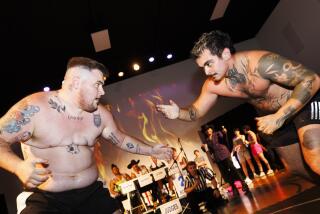Priest’s Wrestling Web Site Shut
A Web site run by a Roman Catholic priest in Pennsylvania that sold videos of bare-chested teenage boys wrestling--ostensibly to raise funds for a severely injured Orange County man--was closed down voluntarily Wednesday.
A similar site started by a former Orange County priest shut down last year.
Although the founders of both sites had said the proceeds would go to help Tomas Mejia of Lake Forest, the man’s family said they have received no charitable funds during the last several years.
A director of one of the groups running a Web site said the materials on the site are an innocent spoof of wrestling, and the group has sent money regularly for the Mejia family.
An initial fund to help the family was set up in 1994 by Father James Curran, who worked in the Diocese of Orange then. Tomas Mejia, a former prep star at El Toro High School, was paralyzed and suffered severe brain damage in a 1994 traffic accident before his sophomore year. His family had no insurance.
Curran said through an attorney Thursday that he met Father Glenn Michael Davidowich in 1997 or 1998 on the East Coast and told him about Mejia’s plight.
The Pennsylvania priest offered to help.
Davidowich, pastor of St. Michael the Archangel Byzantine Catholic Church in Mont Clare, Penn., founded the Junior Professional Wrestling Assn. in 1999. In filings seeking nonprofit status, he said the purpose was to help pay continuing medical bills for Tomas Mejia.
For the last three years, the association’s Internet site has featured photos of youthful grapplers--some as young as 16--with such nicknames as “Corporal Punishment” and “Johnny Heartbreaker.”
It also peddled a long list of its own wrestling videos, such as “Back-to-School Bash,” “Heat Stroke 2” and “Cabin Fever 2,” some shot in a church rectory. The videos sold for roughly $20 apiece. The nonprofit did not file required tax returns that would have indicated how much money it brought in and gave away.
Davidowich sent Curran “one or two checks” totaling about $1,500, said Richard Leamy, an attorney for the Claretian Missionaries, the order of priests to which Curran belongs. Leamy said Curran severed fund-raising ties with the wrestling organization several years ago after viewing its Web site and finding the photographs distasteful.
Curran, now an associate pastor at a church in Stone Mountain, Ga., declined to comment.
But public documents show that Curran undertook a similar enterprise about the same time Davidowich did.
He listed himself as owner of Con Ganas Sports Entertainment in 1999 fictitious-business-name statements, and gave, as an address, St. Joseph Church in Placentia, where he was an associate pastor. Con Ganas is Spanish for “with desire” or “with enthusiasm.”
The Con Ganas Web site featured fund-raising pleas for Tomas Mejia, along with beefcake poses of high school wrestlers, videos of prep wrestling matches and unofficial tussles featuring athletes named “Y2K Hunk” and “Surfin’ Superboy.” Video titles include: “The Future Looks Good” and “Class Act.”
The site, which listed a Placentia post-office box as the organization’s address, signed off last summer with this notice:
“Con Ganas Sports began in the summer of 1999 as a not-for-profit sports entertainment entity, specializing in professional wrestling with the sole purpose of generating funds for the Tomas Mejia Fund.... Con Ganas has decided to discontinue production indefinitely, while we consider more cost-efficient ways of accomplishing our original purpose.”
When told late Thursday of Curran’s former Web site and business, attorney Leamy said, “That’s news to me. I can’t really comment.”
Curran left the Orange diocese last summer. A diocesan spokeswoman said the church had no knowledge of the business and wouldn’t have allowed it if it had. She also noted that Curran had only complimentary reviews in his personnel file.
Marcella Mejias, who along with her husband, cares for her son in a two-bedroom apartment, said this week that she had never heard of any wrestling associations designed to raise money for Tomas and hasn’t received a check from any group for years. She said the initial fund started by Curran, a priest she admires, has been closed down.
“My life is taking care of my son and that’s it,” she said. “We don’t have any idea of what [the wrestling association] is about.”
Tony Karl, director of the Pennsylvania group, said in a written statement that his organization each year sent a check for about $2,000 for Mejia to Curran, though the last check was returned because the priest had moved from Orange County.
Karl said the site has been criticized by Davidowich’s parishioners as sexually suggestive and unseemly for a church-connected organization. The wrestlers are scantily dressed and earlier photographs showed some of them in dog collars and chains.
Davidowich allowed a few wrestling matches, which were videotaped, on St. Michael’s property during the summer of 2000, Karl wrote in an e-mail response to reporters’ questions.
“In August 2000, Davidowich realized it was poor judgment to film on parish property” and halted the practice, Karl wrote.
Karl said Davidowich resigned from the wrestling association after meeting with his bishop in February 2001. Still, he was featured prominently on its Web site up until it closed this week, and he was listed until recently as the nonprofit’s director.
Bishop Andrew Pataki of the Byzantine Catholic Eparchy of Passaic in West Patterson, N.J., did not return phone calls or e-mails seeking comment.
Law enforcement officials in Pennsylvania said they haven’t received any complaints about the Web site and are not investigating.
Karl contends that the site’s photographs have been misconstrued. “[We] provide sports entertainment, and nothing more,” he said. “It’s a makeshift attempt to mimic and spoof pro wrestling.”
Ages of the wrestlers ranged from 16 to 30, Karl said, with minors getting parental permission.
More to Read
Sign up for Essential California
The most important California stories and recommendations in your inbox every morning.
You may occasionally receive promotional content from the Los Angeles Times.










